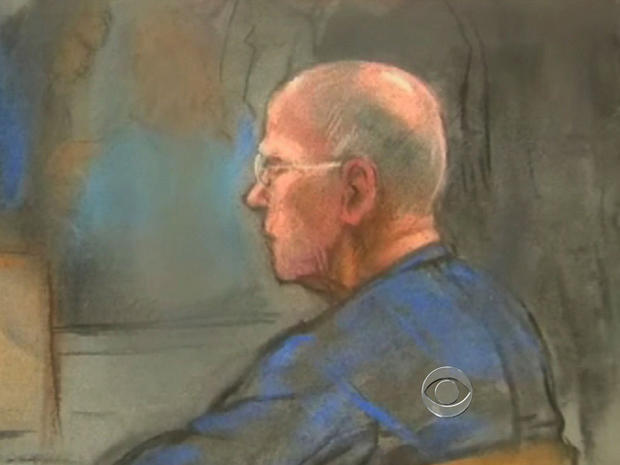Trial of reputed Boston mobster Whitey Bulger begins
(CBS News) BOSTON - In federal court in Boston, opening statements were made Wednesday in a trial that was decades in the making. Whitey Bulger is charged with murdering 19 people as head of Boston's Irish mob. He became a legend over the long years that it took to track him down.
Prosecutors described James "Whitey" Bulger as the center of mayhem and murder in Boston for 30 years, a man so dangerous he joined Osama bin Laden at the top of the FBI's most wanted list.
Federal prosecutor Brian Kelly told the jury Bulger was a "hands-on killer" who "did the dirty work himself" as the boss of Boston's notorious Winter Hill Gang.
The 83-year-old is accused of drug-trafficking, extortion, and murder - all while working as an FBI informant. He was on the lam for 16 years until he was arrested in California in 2011.
Bulger's defense attorney, J.W. Carney, acknowledged his client did commit some crimes, including bookmaking, drug-trafficking and loan-sharking. But he insisted Bulger was not a murderer - or worse - a government snitch.
Bulger's gang "ran amok" in Boston for nearly 30 years, prosecutors say
Reputed mobster "never, ever" was FBI informant, attorney says
Defense team to argue FBI facilitated "Whitey" Bulger's crimes, analyst says
"The worst thing an Irish person could consider doing was becoming an informant," Carney said.
Instead, he argued, Bulger paid off law enforcement officers in exchange for information on surveillance and searches that could have brought down Bulger's crew.
"The difference between him and your average, stock-variety gangster is that he had the protection of the FBI," said Boston Globe columnist Kevin Cullen, who has covered Bulger for more than 30 years.
"Reputation for everything to Whitey Bulger," said Cullen. "He has been obsessed with it ever since he was a young hoodlum. That screws up his whole narrative - the narrative he spent his whole life creating."
Bulger's attorney said his client does plan to take the stand in his own defense. The trial is expected to last at least three months.

